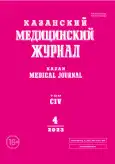Features of local and systemic indicators in chronic rhinitis
- Authors: Goncharova N.S.1, Smirnova O.V.1
-
Affiliations:
- Federal Research Center “Krasnoyarsk Scientific Center” of the Siberian Branch of the Russian Academy of Sciences
- Issue: Vol 104, No 4 (2023)
- Pages: 614-622
- Section: Clinical experiences
- URL: https://journal-vniispk.ru/kazanmedj/article/view/145722
- DOI: https://doi.org/10.17816/KMJ115032
- ID: 145722
Cite item
Abstract
Aim. The study of the features of local and systemic indicators in chronic rhinitis.
Material and methods. The study groups included 21 patients with chronic allergic rhinitis, 20 patients with chronic vasomotor rhinitis, 9 patients with chronic atrophic rhinitis, 15 patients with chronic infectious rhinitis and 50 people from the control group. Diagnosis of chronic rhinitis, depending on the phenotype, taking into account the clinical recommendations of the Ministry of Health of Russia, was carried out by a doctor when the patient applied for treatment, followed by analysis of the data from a full range of instrumental examinations, clinical manifestations, anamnesis, and rhinoendoscopy results. 65 subjects with chronic rhinitis, as well as the control group, underwent a cytological examination of the nasal mucosa and an assessment of hematological parameters. Statistical analysis was carried out using the Statistica 10 package. Differences in groups were assessed using the nonparametric Kruskal–Wallis test (for three or more comparison groups) and Mann–Whitney test (for pairwise comparison). The critical level of statistical significance in testing scientific hypotheses was p ˂0.05.
Results. In chronic allergic rhinitis, three syndromes were locally identified: allergic syndrome (with a statistically significant increase in the absolute number of eosinophils up to 14 per field of view), non-specific inflammation syndrome (with a statistically significant increase in the number of leukocytes up to 9 per field of view) and a syndrome of protective changes in the nasal mucosa. At the same time, changes associated with allergic syndrome were recorded in the blood (with a statistically significant increase in the absolute number of eosinophils up to 0.84×109/l). In chronic vasomotor rhinitis, changes in the nasal mucosa did not cause significant changes in the activity of blood cells. In chronic atrophic rhinitis, degenerative changes in the nasal mucosa (with a statistically significant decrease in the number of epithelial cells up to 2 per field of view; p1–4 <0.001, p2–4 <0.001) with local hemorrhagic syndrome were accompanied by the presence of statistically significant anemic (hemoglobin up to 109 g/l; p1–4 <0.001, p2–4 <0.001, p3–4 <0.001, p4–5 <0.001) and inflammatory syndromes in terms of blood parameters (with statistically significant leukocytosis up to 10×109/l; p1–4 <0.001, p2–4 <0.001, p3–4 <0.001). In chronic infectious rhinitis, local inflammatory syndrome with a statistically significant increase in the number of leukocytes up to 75 per field of view (p1–5 <0.001, p2–5 <0.001, p3–5 <0.001, p4–5 <0.001) with protective changes in the nasal mucosa confirmed by systemic inflammatory syndrome with statistically significant leukocytosis up to 12×109/l (p1–5 <0.001, p2–5 <0.001, p3–5 <0.001, p4–5=0.04), neutrophilic granulocytosis up to 9×109/l (p1–5 <0.001, p2–5 <0.001, p3–5 <0.001, p4–5=0.03) and an increase in the erythrocyte sedimentation rate up to 22 mm/h (p1–5 <0.001, p2–5 <0.001 , p3–5 <0.001, p4–5 <0.001) according to blood tests.
Conclusion. The greatest number of local and systemic changes was found in chronic allergic and chronic infectious rhinitis, which requires increased attention to these diseases.
Full Text
##article.viewOnOriginalSite##About the authors
Natalya S. Goncharova
Federal Research Center “Krasnoyarsk Scientific Center” of the Siberian Branch of the Russian Academy of Sciences
Author for correspondence.
Email: nzelenyk@gmail.com
ORCID iD: 0000-0003-3547-7813
Junior Researcher, PhD Stud.
Russian Federation, Krasnoyarsk, RussiaOlga V. Smirnova
Federal Research Center “Krasnoyarsk Scientific Center” of the Siberian Branch of the Russian Academy of Sciences
Email: ovsmirnova71@mail.ru
ORCID iD: 0000-0003-3992-9207
M.D., D. Sci. (Med.), Prof., Head of the Laboratory, Laboratory of Clinical Pathophysiology
Russian Federation, Krasnoyarsk, RussiaReferences
- Blotskiy AA, Karpishchenko SA, Blotskiy RA. The comparative analysis of efficiency of surgical treatment of chronic rhinitis in out-patient basis. Dalnevostochnyy meditsinskiy zhurnal. 2012;(4):82–85. (In Russ.)
- Blotskiy AA, Karpishchenko SA, Blotskiy RA. Treating vasomotor rhinitis with high-energy laser device in outpatient settings. Pacific Medical Journal. 2013;(3):79–80. (In Russ.)
- Krylova TA, Zavaliy MA, Balabantsev AG. Differential diagnosis of allergic and non-allergic chronic rhinitis. Prakticheskaya meditsina. 2015;(2-2):13–18. (In Russ.)
- Karpova EP, Baratashvili AD. Phenotypic classification of rhinitis and major treatment approaches. RMJ. Medical review. 2019;3(8):33–36. (In Russ.)
- Wilson KF, Spector ME, Orlandi RR. Types of rhinitis. Otolaryngol Clin North Am. 2011;44(3):55–59. doi: 10.1016/j.otc.2011.03.016.
- Bodnya OS, Nenasheva NM. Second generation antihistamines in allergic rhinitis: experience in real clinical practice. Russkiy Meditsinskiy Zhurnal. 2019; 27(3):45–50. (In Russ.)
- Lopatin AS, Varvyanskaya AV. Vasomotor rhinitis: pathogenesis, clinic, diagnosis and possibilities of conservative treatment. Prakticheskaya pulmonologiya. 2007;(2):33–38. (In Russ.)
- Wallace DV, Dykewicz MS, Kaliner MA. Classification of nonallergic rhinitis syndromes with a focus on vasomotor rhinitis, proposed to be known henceforth as nonallergic rhinopathy. World Allergy Organ J. 2009;2:98–101. doi: 10.1097/WOX.0b013e3181a9d55b.
- Morozov AM, Sorokovikova TV, Zhukov SV, Morozova AD, Ryzhova TS, Muravlyantseva MM, Pichugova AN, Minakova YuE. Current markers of inflammation in clinical practice. Sovremennye problemy nauki i obrazovaniya. 2022;(3):142. (In Russ.) doi: 10.17513/spno.31653.
- Belyakova RA. Rhinocytogram as a diagnostic method for allergic rhinitis. Molodoy uchenyy. 2017;(12):120–123. (In Russ.)
- Kovalenko LA, Sukhodolova GN. Integral hematological indices and immunological parameters in acute poisoning in children. General Reanimatology. 2013;9(5):24. (In Russ.) doi: 10.15360/1813-9779-2013-5-24.
- Rondon C, Campo P, Togias A, Fokkens WJ, Durham SR, Powe DG, Mullol J, Blanca M. Local allergic rhinitis: concept, pathophysiology, and management. J Allergy Clin Immunol. 2012;129(6):1460–1467. doi: 10.1016/j.jaci.2012.02.032.
- Stepanov EN. The role of the rhinal mucous membrane microcirculation's disbalance in pathogenesis of different types of chronic rhinitis. Prakticheskaya meditsina. 2011;(3-1):11–14. (In Russ.)
- Garsia GJM, Bailie N, Martins DA. Atrophic rhinitis: a CFD study of air conditioning in the nasal cavity. J Appl Physiol. 2007;103(3):1082–1092. doi: 10.1152/japplphysiol.01118.2006.
- Parilova OV, Kapustina TA, Belova EV, Markina AN. Epidemiological and immunological characteristics in adults with chronic inflammatory diseases of nose and paranasal sinuses, associated with chlamydia infection. Russian journal of immunology. 2016;10(2):184-184. (In Russ.)
Supplementary files





